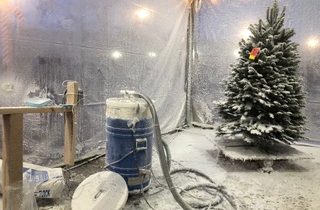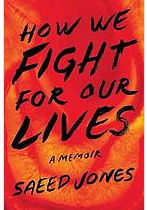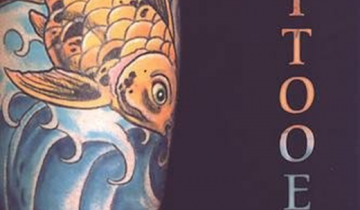by Rebecca Stoddard
Well, January 2020 has almost entirely slipped by and, counter to our contemporary tendency toward the breakneck speed of things, I am just now finishing up my list of queer faves from 2019. Before I look toward the mound of books I’ve yet to finish or even begun, I want to first point backwards to just a few takes from this past year (and a couple before that). The list includes both books and events that were highlights and/but it is truly far from exhaustive. There were so many things I wanted to get to but as I have already mentioned, I am slow, a sloth really, and simply couldn’t accomplish even half of what I aspired to.
That being said, 2019 began for me with one of my favorite readings of the year at Alley Cat Books in San Francisco. The lineup included Lauren Levin, Julian Talamantez Brolaski and Erick Sáenz to celebrate the book launch of Levin’s Justice Piece//Transmission, a book that was likewise, one of my favorites of this year. That the reading took place on my birthday made it even more dear to me, but that was a private pleasure. Sáenz, whose Sussuros a Mi Padre (The Operating System, 2018) I had recently read and admired not only for both its tone and interrogation of disrupted language/culture/family narrative/California story, opened the reading with attentive, if quiet, love poems. Julian Talamantez Brolaski, a poet whose work I always admire, followed with poems that were, in equal measure, funny, personal, linguistically interesting and characteristically smart. These sexy poems had the atmosphere and slow-building fever pitch of ceremonial transmission and when they finished there was the feeling one had gone through something with them. Levin’s reading from JP//T gave full body/voice and added even more (is it possible, yes!) nuance, warmth, humor and tenderness to a text I had already read several times in anticipation of writing a review (more on that in a minute). After the reading I ducked out quickly to go celebrate my birthday quietly/privately but with the feeling I had already eaten a celebratory and seriously nourishing meal that I wouldn’t finish metabolizing any time soon.
 So, Lauren Levin’s Justice Piece//Transmission (Timeless Infinite Light. 2018. 9781937421250.) I had originally planned to write a much more in-depth review of Levin’s book for this blog but a series of events, both personal and professional (including forgetting to attend to some pesky admin while being in the throes of aforementioned drama and thus inadvertently being removed from the committee, eek!), have delayed and ultimately betrayed my once good intention and led instead to this micro-review being the only remaining remnant of an erstwhile slightly more muscled undertaking. All of that aside, I love this little book. Equal parts inquiry, essay, poetry, memoir, list, rumination and dispatch, these two pieces work at untangling the knots of social order/s and disorder/s, family obligations and intimacies, casually constructed histories and real-time current events that remain fiercely personal with ample cause for doubt and curiosity. Indeed the text asks a lot: of the author to self, of the author to us as readers, and it poses questions which in some cases are no doubt rhetorical or just straight up too impossible to answer. The book is smart but accessible and as a reader I was totally down for the expanded/expanding lens of justice, queerness, race, desire, Jewishness, maternity, etc. that are suggested in these pages but so too, I was ok putting the book down with just as many questions, if not more, than when I began. In fact, the book is a testament to just how one holds questions, forgoing any notion of surety, while continuing to move forward with a sense of intentionality. Justice Piece // Transmission was published in 2018 by the now defunct Timeless Infinite Light, an Oakland based small press and would be appropriate for any library collecting contemporary experimental poetry and/or cross-genre works.
So, Lauren Levin’s Justice Piece//Transmission (Timeless Infinite Light. 2018. 9781937421250.) I had originally planned to write a much more in-depth review of Levin’s book for this blog but a series of events, both personal and professional (including forgetting to attend to some pesky admin while being in the throes of aforementioned drama and thus inadvertently being removed from the committee, eek!), have delayed and ultimately betrayed my once good intention and led instead to this micro-review being the only remaining remnant of an erstwhile slightly more muscled undertaking. All of that aside, I love this little book. Equal parts inquiry, essay, poetry, memoir, list, rumination and dispatch, these two pieces work at untangling the knots of social order/s and disorder/s, family obligations and intimacies, casually constructed histories and real-time current events that remain fiercely personal with ample cause for doubt and curiosity. Indeed the text asks a lot: of the author to self, of the author to us as readers, and it poses questions which in some cases are no doubt rhetorical or just straight up too impossible to answer. The book is smart but accessible and as a reader I was totally down for the expanded/expanding lens of justice, queerness, race, desire, Jewishness, maternity, etc. that are suggested in these pages but so too, I was ok putting the book down with just as many questions, if not more, than when I began. In fact, the book is a testament to just how one holds questions, forgoing any notion of surety, while continuing to move forward with a sense of intentionality. Justice Piece // Transmission was published in 2018 by the now defunct Timeless Infinite Light, an Oakland based small press and would be appropriate for any library collecting contemporary experimental poetry and/or cross-genre works.
 Speaking of books that were published in 2018 that I loved-on in 2019, Stacy Szymaszek’s A Year From Today (Nightboat Books. 2018. 9781937658762) was exactly what I was looking for in an otherwise unkempt and tumultuous year. This journal-like poem, third in a trilogy, records fragments written over the course of a year in New York City where the writer lived and worked as the Executive Director at the Poetry Project from 2007-2018. What was most interesting to me when reading, was the snapshot of mid-life: the body and their relationship to work and to friends, and to one’s environment when age and time and value are all factors taking on new dimensions. In the vein of NY school poetry, NYC is ever-present here and like the middle-aged body itself, the city seems both ordered and disordered, adored and really f*&^ing annoying. As in Szymaszek’s other work, the text is funny, at times self-deprecating, but also blunt, humble and utterly surprising. IE: I kind of can’t get enough and was disappointed when the book came to an end. It is appropriate for any library collecting contemporary poetry. (As an aside– Szymaszek also published a lo-fi zine this year called Mid Hriff which collected several poems from poet-friends including, among others, stellar pieces from Rachel Levitsky and Kimberly Alidio, upon the occasion of Szymaszek’s 50th bday and in respect for, “the experience of middle life.” It’s worth trying to get your hands on. Also, Szymaszek’s posts for Futurefeed, the blog of Future Poem Press, were fantastic.)
Speaking of books that were published in 2018 that I loved-on in 2019, Stacy Szymaszek’s A Year From Today (Nightboat Books. 2018. 9781937658762) was exactly what I was looking for in an otherwise unkempt and tumultuous year. This journal-like poem, third in a trilogy, records fragments written over the course of a year in New York City where the writer lived and worked as the Executive Director at the Poetry Project from 2007-2018. What was most interesting to me when reading, was the snapshot of mid-life: the body and their relationship to work and to friends, and to one’s environment when age and time and value are all factors taking on new dimensions. In the vein of NY school poetry, NYC is ever-present here and like the middle-aged body itself, the city seems both ordered and disordered, adored and really f*&^ing annoying. As in Szymaszek’s other work, the text is funny, at times self-deprecating, but also blunt, humble and utterly surprising. IE: I kind of can’t get enough and was disappointed when the book came to an end. It is appropriate for any library collecting contemporary poetry. (As an aside– Szymaszek also published a lo-fi zine this year called Mid Hriff which collected several poems from poet-friends including, among others, stellar pieces from Rachel Levitsky and Kimberly Alidio, upon the occasion of Szymaszek’s 50th bday and in respect for, “the experience of middle life.” It’s worth trying to get your hands on. Also, Szymaszek’s posts for Futurefeed, the blog of Future Poem Press, were fantastic.)
 Omotara James’ chapbook Daughter Tongue (Akashic Books, 2018. 9781617756344), also published in 2018 but read by me in 2019, was part of a chapbook box set called New-Generation African Poets put out by Akashic Books and edited by Kwame Dawes & Chris Abani. The box is stunning and each chap, of which there are 12 in total, has cover art featuring the artist Sokari Douglas Camp. James is a British-born NY based American poet whose parents are Nigerian and Trinidadian immigrants. The poems in this chap invoke both ideas of lineage and language of a very modern world that exists in memory as well as on Instagram. The opening poem, Prologue to a Name begins, “The body is an unmarked grave before it is given a name.” The chap continues from there to wiggle through themes of tongues (language), selves, autonomy, gender and identity (Gender Motherf*&cker is an absolute highlight), and finally lands at the insistent and inspirational closing lines of the chap, “Go/ where the love is/ The Greatest.” As a reader, I was all-in for all of it. James has won numerous awards and while she does not yet have a full length book, I doubt it will remain that way for long and I will be first in line. The boxset is appropriate for any library collecting small press and/or international poetry.
Omotara James’ chapbook Daughter Tongue (Akashic Books, 2018. 9781617756344), also published in 2018 but read by me in 2019, was part of a chapbook box set called New-Generation African Poets put out by Akashic Books and edited by Kwame Dawes & Chris Abani. The box is stunning and each chap, of which there are 12 in total, has cover art featuring the artist Sokari Douglas Camp. James is a British-born NY based American poet whose parents are Nigerian and Trinidadian immigrants. The poems in this chap invoke both ideas of lineage and language of a very modern world that exists in memory as well as on Instagram. The opening poem, Prologue to a Name begins, “The body is an unmarked grave before it is given a name.” The chap continues from there to wiggle through themes of tongues (language), selves, autonomy, gender and identity (Gender Motherf*&cker is an absolute highlight), and finally lands at the insistent and inspirational closing lines of the chap, “Go/ where the love is/ The Greatest.” As a reader, I was all-in for all of it. James has won numerous awards and while she does not yet have a full length book, I doubt it will remain that way for long and I will be first in line. The boxset is appropriate for any library collecting small press and/or international poetry.
Representation was a consistent theme this year and was indeed the constellating mission of the exhibit Show Me as I Want to Be Seen curated by Natasha Matteson for the Contemporary Jewish Museum in San Francisco. The show took cues from that infamous declaration of identity in The Book of Esther as well as from the Talmudic idea of svara (the ability to reason) and looked at traces of self-determination in Jewish portraiture beginning with those masters of fluidity, Claude Cahun and Marcel Moore. From Zanele Muholi’s stark but lush photography and Davina Semo’s kinda creepy metal “slit”, to Isabel Yellin’s creaturely textile sculptures, the exhibit was as fantastically varied as one would hope considering the topic. The other artists featured were Nicole Eisenman, Rhonda Holberton, Hiwa K, Young Joon Kwaki, Toyin Ojih Odutola, Gabby Rosenberg, and Tschabalala Self. A fully illustrated 112 pg. catalog published by the museum accompanied the show and would be appropriate for libraries collecting contemporary art books or looking to expand their queer arts catalogs collection.
On the topic of artists, several of our greats passed this year one of whom was pioneering queer experimental filmmaker and activist Barbara Hammer. Important to me as a young artist, Hammer exemplified lesbian activism via art (nowadays simply called artivism) and was one of the first lesbians I was aware of really documenting lesbian history and existence in/on film while also attempting aesthetic experimentation. There have been several retrospectives of her work since she passed and I was able to make it to the Cinema of Intimacy screening at the Roxie in San Francisco co-presented by Canyon Cinema Foundation and with introductions from Susannah Magers and Tanya Zimbardo. The selections were early films (1974-82) that had been shot in the Bay Area and watching (re-watching some) was a reminder of how bold she had been but also, how fun! Above all else, Hammer delivered everything with a sense of humor like some really dyke-y version of a brownie (and here I mean the mischievous elf not the precursor to Girl Scouts.) Her work has been documented in books which would be appropriate to collections including other queer artists and/or experimental filmmaking. An incredible interview in The New Yorker is one of, if not *the last she did, and is discussion about her activism regarding end of life agency. It also reads as a really beautiful meditation on partnership.
Several other events I want to mention are:
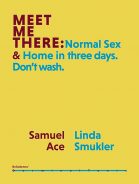
 Samuel Ace & Ari Banias’ reading at Alley Cat Books in San Francisco. I had read Ace’s work (under the name, Linda Smukler) as a women’s/queer studies undergrad almost twenty years ago and had been completely floored by its overt sexiness and experimentation, so it was more than a pleasure to see/hear him read from old work that remains as brazen and immediate as ever. The reading was in celebration of his book Meet Me There: Normal Sex & Home in three days. Don’t Wash (Belladonna, 2019. 9780998843926) the reprint of two early works, and he also presented newer work from, Our Weather, Our Sea (Black Radish Books, 2019. 9781732131118). Both books are appropriate for libraries collecting contemporary poetry and/or building their queer lit sections.
Samuel Ace & Ari Banias’ reading at Alley Cat Books in San Francisco. I had read Ace’s work (under the name, Linda Smukler) as a women’s/queer studies undergrad almost twenty years ago and had been completely floored by its overt sexiness and experimentation, so it was more than a pleasure to see/hear him read from old work that remains as brazen and immediate as ever. The reading was in celebration of his book Meet Me There: Normal Sex & Home in three days. Don’t Wash (Belladonna, 2019. 9780998843926) the reprint of two early works, and he also presented newer work from, Our Weather, Our Sea (Black Radish Books, 2019. 9781732131118). Both books are appropriate for libraries collecting contemporary poetry and/or building their queer lit sections.
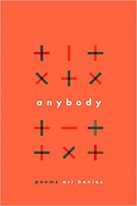 Ari Banias—whose poems I have loved since first reading his chap What’s Personal is Being Here with All of You (Portable Press @ YoYo Labs, 2012) and up through his most recent full length, Anybody: Poems (WW Norton & Co, 2018. 9780393355444)—opened by reading new work from a WIP that uses language from an early feminist text. This was the first time I heard him read and these poems took content that was maybe otherwise so and gave it new life via interrogation but so too, leant it a kind of grace: smart, funny, tender, etc. and I am definitely looking forward to seeing them in print.
Ari Banias—whose poems I have loved since first reading his chap What’s Personal is Being Here with All of You (Portable Press @ YoYo Labs, 2012) and up through his most recent full length, Anybody: Poems (WW Norton & Co, 2018. 9780393355444)—opened by reading new work from a WIP that uses language from an early feminist text. This was the first time I heard him read and these poems took content that was maybe otherwise so and gave it new life via interrogation but so too, leant it a kind of grace: smart, funny, tender, etc. and I am definitely looking forward to seeing them in print.
Africa State of Mind at MOAD was the only U.S. showing of a touring exhibition curated by Ekow Eshun for the New Art Exchange. The show featured photographers from across the continent of Africa working with themes of life and identity in a “place” that proves to be as much a psychological condition as a physical space. The queer representation in this show was surprisingly solid with some astonishing works from Ruth Ossai, Athi-Patra Ruga, Eric Gyamfi, and Sabelo Mlangeni. There are good reviews of and context for the show here and here.
Triple Consciousness: Films by Akosua Adoma Owusu presented by SF Cinematheque at Yerba Buena Center for the Arts was another really great event. At this screening, Owusu showed four of her films followed by a discussion with Leila Weefur (of the local curatorial collective The Black Aesthetic). Riffing off of W.E.B. DuBois’ idea of double consciousness, the films were curated around the idea of a triple consciousness: feminism, queerness and the African immigrant experience and how these are an inescapable/constant/essential presence in the work. The films, and the follow up discussion, centered on identity and subjectivity as questions that I thought allowed more for speculation and experiment than for assertion. And I mean this in the best sense: the talk was super insightful but also, fun, positive and generative in a way that felt refreshing and welcome in this heavy year. Like, just maybe, there might be room for opening and expanding and not just shutting it all down.
Speaking of refreshing!!! Signals from the West: Bay Area Artists in Conversation with Merce Cunnigham at 100 was a show that celebrated the centennial year of late pioneering queer dancer/choreographer, Merce Cunningham. I almost feel not up for the task of writing about this deeply moving show, but I want you all to know about it so I will, at the very least, give a quick overview! In a bicoastal collaboration, Hope Mohr Dance’s The Bridge Project, SF MOMA’s Open Space, ODC Theater, and the Merce Cunningham Trust commissioned ten Bay Area artists to workshop, with each other and with Cunningham dancers, and then to generate and present a unique piece of work, at ODC Theater in San Francisco, that derived from that workshop experience. Beginning with lobby installations and then continuing inside the theater the performances opened with a land acknowledgment by Kanyon Sayers-Roods and what followed were several dance-based works, vocal performances, a hilarious short play by Maxe Crandall (reminiscent of the late great Bay Area Poets Theater’s Kevin Killian!!), and even an audience-gasping whip performance (hello!) by Danny Thanh Nguyen. There is so much to say about the talent here and literally every single performance was wildly imaginative and held together in Cunningham’s spirit of innovation, abstraction, spatial awareness and collaboration. But also, at least for this audience member, the performance reminded me of why I moved to SF twenty years ago and while so much has changed and so many artists have fled, it was evidence that there are still deep pockets of truly phenomenal work. Other than those already mentioned, the commissioned artists were: Sophia Wang (with Brontez Purnell), Sofía Córdova, Alex Escalante, Julie Moon, Christy Funsch, Jenny Odell, Nicole Peisl, Danishta Rivero and Dazaun Soleyn. The curators were Claudia La Rocco, Hope Mohr and Julie Potter.
 On the subject of sheer talent, there are few fiction writers who blow me away quite like Renee Gladman. Morelia: a Novel (Solid Objects, 2019. 9780986235580), like her other work, builds character and motion/plot/place/pace through architecture that is ghost-like, at best. We sometimes don’t even know how we move from one landscape to the next and the surrealism is both wild and emotive. What I admire in Gladman’s prose is how, even in the slippery environments she constructs, we witness an inescapable human-ness and connection of being, as in this paragraph:
On the subject of sheer talent, there are few fiction writers who blow me away quite like Renee Gladman. Morelia: a Novel (Solid Objects, 2019. 9780986235580), like her other work, builds character and motion/plot/place/pace through architecture that is ghost-like, at best. We sometimes don’t even know how we move from one landscape to the next and the surrealism is both wild and emotive. What I admire in Gladman’s prose is how, even in the slippery environments she constructs, we witness an inescapable human-ness and connection of being, as in this paragraph:
“Somewhere in the city of my destination a light turns on in a second-floor window. A person, awakened due to grief in the lungs, stand in her kitchen. A light comes on, across the street, second-floor. It’s late, there is no other source of illumination: the moon is dead, or hidden behind fog. The woman in her kitchen brings a glass of water to her mouth and waits for a figure to appear at the window. A light goes on, someone usually looks out but does not in this instance. Still there is the water in the glass. The woman drinks it then returns to nether parts of the house. Across the street, in a second-floor bedroom, a young person inadvertently solves a puzzle, first in a dream, then again in the moment after waking. A string of words that fits perfectly in this slot. He reaches his hand out to restore the room to darkness, hesitates at something, like, what does it all mean, and then completes the light-changing act. Now the street, now finally dark.”
 Isabel Waidner’s We Are Made of Diamond Stuff (Dostoyevsky Wannabe, 2019. 9781999924539) took me by surprise. Many of the books I read this year were by writers I was already familiar with; Waidner was new to me. Having picked up the book because I loved the cover, I was further encouraged by Dodie Bellamy’s blurb on the back (Bellamy’s classic Cunt-Ups [Tender Buttons Press; 17th Anniversary Edition edition; 9780927920179] was reprinted this year as well and is a must for alt-lit queer collections.) Waidner’s anxious, frenetic and funny critique of British empire/class and adamant resistance to militarism are given a framework that is as fresh as it is hopeful. I don’t read a lot of fiction but when I do, this is the kind of book I hope for. While it might be in the vein of New Narrative, as such, I’d say this is an entirely new New Narrative.
Isabel Waidner’s We Are Made of Diamond Stuff (Dostoyevsky Wannabe, 2019. 9781999924539) took me by surprise. Many of the books I read this year were by writers I was already familiar with; Waidner was new to me. Having picked up the book because I loved the cover, I was further encouraged by Dodie Bellamy’s blurb on the back (Bellamy’s classic Cunt-Ups [Tender Buttons Press; 17th Anniversary Edition edition; 9780927920179] was reprinted this year as well and is a must for alt-lit queer collections.) Waidner’s anxious, frenetic and funny critique of British empire/class and adamant resistance to militarism are given a framework that is as fresh as it is hopeful. I don’t read a lot of fiction but when I do, this is the kind of book I hope for. While it might be in the vein of New Narrative, as such, I’d say this is an entirely new New Narrative.
Moving in a different direction altogether, is the nostalgic reprint of The Faggots and the Friends Between Revolutions by Larry Mitchell, illustrated by Ned Asta (Nightboat Books, 2019. 9781643620060.) If you even wondered what life is like on a utopian-esque queer commune, this may (or may not) have the answers you are looking for. Mitchell’s writing is playful and unapologetically queer in celebration of a life lived away from the exceptionally constricting/constrictive rules and habits of het-norm society, and more pointedly, the accused, “men”. In fact, the protagonists here are lovingly ascribed faggots, queens, queer men and women who love women and Asta’s anachronistically deco illustrations, featuring frisky and sometimes explicit sexuality, are a perfect match in both mood and play. The book was first published in 1977 by Calamus and circulated in queer enclaves never quite passing into a more mainstream queer lit crowd. Luckily, now we have it newly printed with an intro by queer activist/writer/filmmaker/fashionista, Tourmaline. As archive, as manifesto and fable, this book is pure celebration of queer life and reminded me of so many stories told to me by older gen queer friends about life before AIDS devastated the community. This book is appropriate for any library attending to their queer lit collection.
 Carmen Giménez Smith’s Be Recorder (Graywolf Press, 2019. 9781555978488) was another amazing collection of poetry that I simply couldn’t pass by without mentioning. A totalizing collision of identity/racialized being and empire, this book dismantles the American experience, the experience of being female, of being Latinx and the experience of simply never having or being ‘enough’. Scathing and lyrical, these are mirroring poems that offer a second generation Latinx’s fierce perspective and femme validation. “I became American/when I memorized the national anthem/or when I had sex with a white boy/or when I thought my first racist thought or when I decided/I wanted to always live in a place like US/which is how America becomes/an event that happens only for the lucky” Be Recorder is appropriate for any library poetry collection.
Carmen Giménez Smith’s Be Recorder (Graywolf Press, 2019. 9781555978488) was another amazing collection of poetry that I simply couldn’t pass by without mentioning. A totalizing collision of identity/racialized being and empire, this book dismantles the American experience, the experience of being female, of being Latinx and the experience of simply never having or being ‘enough’. Scathing and lyrical, these are mirroring poems that offer a second generation Latinx’s fierce perspective and femme validation. “I became American/when I memorized the national anthem/or when I had sex with a white boy/or when I thought my first racist thought or when I decided/I wanted to always live in a place like US/which is how America becomes/an event that happens only for the lucky” Be Recorder is appropriate for any library poetry collection.
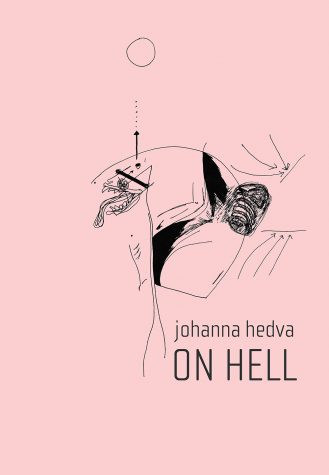 In the vein of totalizing texts, I want to point out two books whose distinguishing feature is their ferocity. Johanna Hedva’s On Hell (Sator Press, 2018. 9780983243786) is a scathing look at the physical (and psychological) impact of capitalism and is brutal in its desire to escape oppressive machinations. Similarly, Andrea Abi-Karam’s Extratransmission (Kelsey St. Press, 2019. 9780932716897) rage against the U.S. military machine is as much insistence on gender expression and trans existence, as it is unapologetically critical of an over(t)ly militarized society and bro culture. Both texts have a punk-rock ethic and both center the body as a site of resistance.
In the vein of totalizing texts, I want to point out two books whose distinguishing feature is their ferocity. Johanna Hedva’s On Hell (Sator Press, 2018. 9780983243786) is a scathing look at the physical (and psychological) impact of capitalism and is brutal in its desire to escape oppressive machinations. Similarly, Andrea Abi-Karam’s Extratransmission (Kelsey St. Press, 2019. 9780932716897) rage against the U.S. military machine is as much insistence on gender expression and trans existence, as it is unapologetically critical of an over(t)ly militarized society and bro culture. Both texts have a punk-rock ethic and both center the body as a site of resistance.
 The last reading I attended this year was yet another event at Alley Cat Books in San Francisco: Gail Scott reading from her re-issued Heroine (Coach House Books, 2019. 9781552453919) and Carla Harryman reading from her recently published Sue in Berlin (Presses universitaires de Rouen et du Havre, 2018. 9791024008196). It had been years since I had heard Harryman read and/but I had never heard Gail Scott and it was a great pleasure to hear Scott reading from what i consider to be a classic lesbian work. In many ways this did indeed seem to be a year of revisiting things I have loved with an even deeper appreciation. Hello middle age(?)
The last reading I attended this year was yet another event at Alley Cat Books in San Francisco: Gail Scott reading from her re-issued Heroine (Coach House Books, 2019. 9781552453919) and Carla Harryman reading from her recently published Sue in Berlin (Presses universitaires de Rouen et du Havre, 2018. 9791024008196). It had been years since I had heard Harryman read and/but I had never heard Gail Scott and it was a great pleasure to hear Scott reading from what i consider to be a classic lesbian work. In many ways this did indeed seem to be a year of revisiting things I have loved with an even deeper appreciation. Hello middle age(?)
A couple other side mentions for smaller works I loved:
Megan Milks’ Kicking the Baby, a chapbook published by Another Planet Press that is a four-part essay/memoir exploring age and trans identity in queer public sex culture. Milks’ writing is sometimes feral, and always smart and playful and their essay style is personable. With a pretty direct handling of sexuality and a very sex-positive vibe, Milks reminds us that sex, in all its forms, is just another facet of life to be explored and one that is as personal as it is political. The chap is appropriate for queer zine and/or small press collections that do not shy from blunt sexual content. Sidenote: Megan Milks’ Kill Marguerite (Emergency Press, 2014. 9780989473606) which I also just read this year, should be included in any queer lit collection looking for lesser known/new voices. Like Waidner’s book, this one, for me, seems on the brink of something else entirely. They have a new book coming out in 2020 that I am very much looking forward to.
 Kim Alidio’s A Cell of Falls (Portable Press @ YoYo Labs, 2019) was another favorite chapbook of the year. Now it is true that certain presses hold a warm spot in my heart, and PP@YYL is certainly one of them, and it is the case because the work they put out is predictably great. So, in that sense, Alidio’s chap was not exactly surprising, save for the fact that she was entirely new to me this year. Her non-narrative poetry propels via a rush of fragments and one of my favorite passages comes on the second to last page in the form of a relentless list of questions (I love questions!): “Do I deserve mercy? Can landscape get my heart straight?” Alidio also has a book coming out in the coming year that I am looking forward to. Appropriate for any zine or small press chap collection.
Kim Alidio’s A Cell of Falls (Portable Press @ YoYo Labs, 2019) was another favorite chapbook of the year. Now it is true that certain presses hold a warm spot in my heart, and PP@YYL is certainly one of them, and it is the case because the work they put out is predictably great. So, in that sense, Alidio’s chap was not exactly surprising, save for the fact that she was entirely new to me this year. Her non-narrative poetry propels via a rush of fragments and one of my favorite passages comes on the second to last page in the form of a relentless list of questions (I love questions!): “Do I deserve mercy? Can landscape get my heart straight?” Alidio also has a book coming out in the coming year that I am looking forward to. Appropriate for any zine or small press chap collection.
One day over the summer I was wandering through local gem Miracle Plum, a neighborhood cooking shop owned by two native Santa Rosa women, when I picked up the cooking zine, Put a Egg On It only to be surprised to find an interview featuring Azikwe Mohammed, Erwin Gorostiza and Sara Schulman (founding member of the Lesbian Avengers whose 2016 Conflict is Not Abuse generated ample conversation in queer crit circles.) How exciting when seemingly disparate worlds collide: a local store, a love of cooking, a queer hero. When I got home I was also thrilled to find, among other little gems, an expose on the Black Panther Breakfast Program and a short essay by trans writer Cooper Lee Bombardier on being a short order cook. (sidenote: Bombardier has a new book coming out in 2020!) It’s been a while since cooking zines were my thing and as such, I had not heard of Put a Egg on It but now I will continue to look for it! Appropriate for zine and/or small press cooking collections.
Two final things. The first being Artforum’s December issue, The Year in Friendship. This feature includes reflections on the deaths of both art historian/critic/curator/AIDS activist Douglas Crimp and choreographer Stanley Love, some Nan Goldin photos, as well as a Hannah Black essay on the socio-politics of friendship. As I mentioned before, this year saw the death of so many queer heroes and it did seem so much of the year was spent reading or watching tributes and this issue of Artforum stepped in line. In this same paying-tribute-to-our-heroes vein, the second thing I want to point out is that Evergreen Review is running a four-part series in remembrance of Bay Area poet/editor/playwright Kevin Killian whose death in June is still being processed by his far-flung community. The online series is written by Lonely Christopher with artwork by Shelley Marlowe and as of now only two have been published. I am very much looking forward to the last two, as well.
As I mentioned before, there were many books I did not finish or even get to start and some of these titles I hope to finish for another post, before diving in to 2020. For queries re: book reviews please contact me at: Rstoddard @ santarosa . edu.

